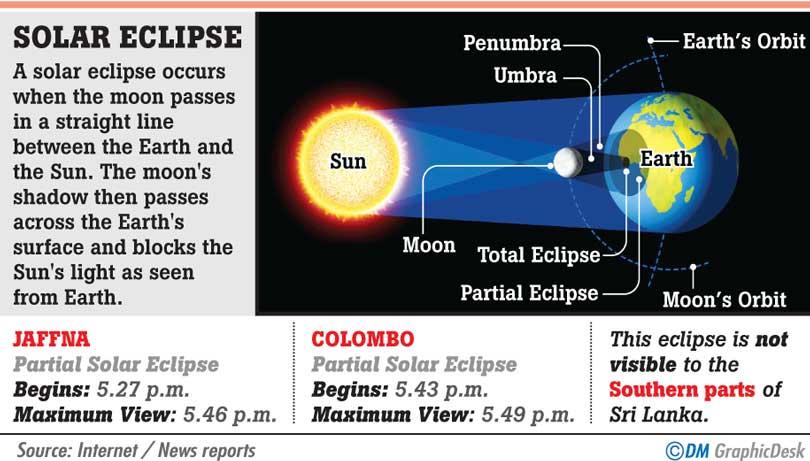Reply To:
Name - Reply Comment

By Yohan Perera
A partial solar eclipse will be visible in many parts of Sri Lanka today. The eclipse will also be visible over much of Europe, North Africa, the Middle East, and western parts of Asia.
In Sri Lanka, the eclipse is best seen from Jaffna, Chairman Arthur C Clarke Institute for Modern Technologies Prof. Chandana Jayaratne said yesterday.
Professor Jayaratne who is also the Director of the Astronomy and Space Science Unit of the Department of Physics, University of Colombo, said the eclipse will be visible to Jaffna at 5.27 p.m. and the maximum eclipse occurs at 5.46 p.m. with 8.8 % of the solar disk covered by the moon.
“For those who live in Colombo, the beginning of the partial eclipse can be observed at 5.43 p.m. and the maximum eclipse occurs at 5.49 p.m. with the moon covering about 1.6% of the solar disk. The partial solar eclipse cannot be observed after 5.52 p.m. due to sunset. This eclipse will be visible to the Colombo area for about 9 minutes,” he said.
“Though the eclipse ends at 6.20 p.m., we can observe it only up to the sunset due at 5.49 p.m. This eclipse will be visible to Jaffna for 22 minutes. The northern part of Sri Lanka, from Anuradhapura to Jaffna, is the most suitable region to observe this eclipse. This eclipse is not visible to the southern parts of Sri Lanka. ,” he added. .
A solar eclipse occurs when the moon passes in a straight line between the earth and the sun. The moon’s shadow then passes across the earth’s surface and blocks the sun’s light as seen from earth. A solar eclipse occurs on a new moon day.
“Usually, there are two eclipses in a row with a two weeks gap. Accordingly, 14 days later, on November 8th 2022, there will be a total lunar eclipse too visible to many parts of the world. That eclipse will be visible to Sri Lanka as a partial lunar eclipse at the moon’s rise on the eastern horizon from 5.48 p.m. to 6.19 p.m.,” he also said.